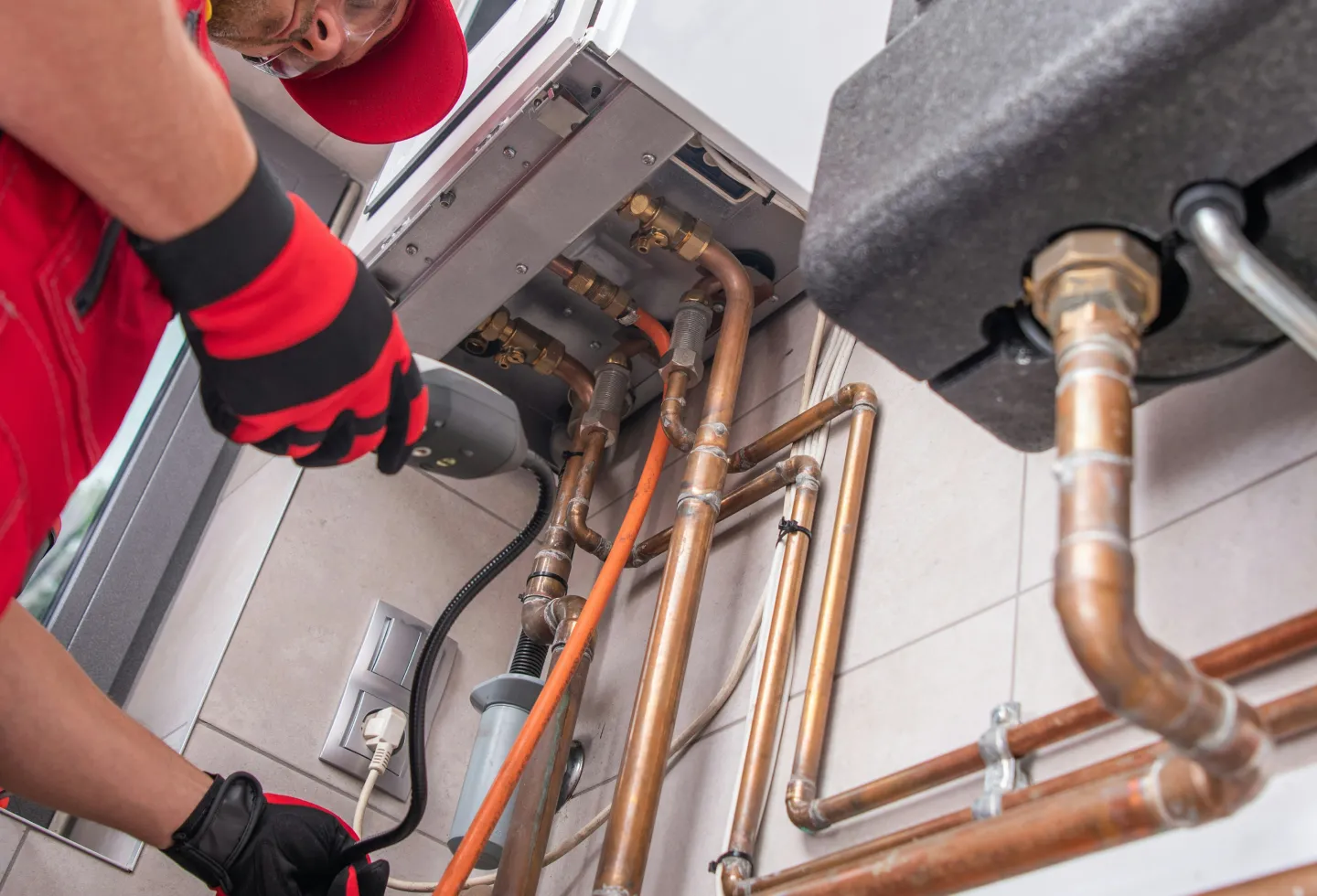Your water heater works quietly behind the scenes, keeping your showers warm and your dishwasher running smoothly—but like any appliance, it won’t last forever. Knowing when to replace your water heater can save you from unexpected cold showers, costly repairs, and potential water damage.
This post will break down the key signs that it’s time for a replacement and help you make the best choice for your home.
When to replace a water heater
Here are some signs that it’s time to replace your water heater.
Your water heater is old
The age of your water heater can be a strong indicator of whether or not it's time to replace it. How long it lasts depends on the type you have—traditional tank or tankless. You can check the serial number on the unit to determine its age, then look up your model to see how long it has been in service.
According to the U.S. Department of Energy, traditional tank water heaters last 8 to 12 years. If it’s more than 12 years old, replacing it proactively is a good idea.
A tankless water heater, on the other hand, can last 15-20 years and even more with proper maintenance.
Ultimately, knowing your water heater’s age, regardless of what type you have, can help you budget for a replacement expense ahead of time.
Inconsistent or lukewarm water
If you notice that your water won’t get hot when you take a bath or shower or that the temperature fluctuates, it could mean that your water heater needs to be replaced.
Water temperature variations could mean the thermostat is failing or the heating elements are malfunctioning. If you haven’t flushed the system or descaled it recently, that could help. If that doesn’t improve your water temperature issues, it’s time to replace it.
Strange noises
Strange noises coming from your water heater are a clear warning sign that something isn’t right. Rumbling, popping, or banging sounds often indicate sediment buildup at the bottom of the tank, which can reduce efficiency and eventually cause damage.
Ignoring these noises can lead to leaks or even a complete failure, so it’s important to have your water heater inspected—or consider replacing it if the issues persist.
Discolored or rusty water
If your water comes out brown or brownish-yellow, it could be a sign of corrosion in your heater tank. Book a maintenance call, but if the discoloration continues after maintenance, replace the unit.
Water around the base of the heater
Water pooling around the base of your water heater is a serious sign that your unit may be failing. Leaks can occur from corrosion, a faulty valve, or cracks in the tank itself. Even a small amount of standing water can lead to water damage, mold, and higher repair costs, so if you notice moisture at the base, it’s time to call a professional—or start considering a replacement.
Higher energy bills
If you notice that your energy bills are higher but you haven’t made any other changes to your usage, it could be a sign that it’s time to replace your water heater. Usually, this happens with older models, and it’s time to upgrade to a more energy-efficient tankless model. The benefit of installing a tankless water heater is lower energy bills in the future.
Rotten egg smell
A strong rotten egg smell coming from your water is usually a sign of bacterial growth in the tank or a reaction between the water and the anode rod. While this isn’t always an emergency, it can make your water unpleasant and may indicate that your water heater is nearing the end of its lifespan.
If the smell persists despite flushing the tank or replacing the anode rod, it may be time to consider a replacement.
How to pay for a new water heater
The average cost to install a water heater ranges from $1,600 to $5,400. Your total cost will depend on whether or not you get a traditional water heater or a tankless one, as well as your location. Here are some ways to pay for this upgrade.
Federal tax credits or rebates
If you purchase an energy-efficient hot water heater, you may be eligible for a federal income tax credit through the end of 2025, which can help defray the costs. Many brands, such as Energy Star, also offer rebates. These tax credits, rebates, and lower energy bills can make replacing your water heater more affordable.
Personal loan
A personal loan is a type of loan that you can use for whatever you need, including home upgrades. The benefit of a personal loan is that lenders don’t require collateral to get one, so you won't put your home at risk if you find yourself unable to make payments.
Home equity loan or HELOC
If you have equity in your home, using a home equity loan or a HELOC (home equity line of credit) can provide the funds needed to cover the purchase and installation, often with lower interest rates than credit cards or personal loans.
A home equity loan provides a lump sum in exchange for fixed monthly payments, whereas a HELOC provides a revolving line of credit.
Home equity investment
If you don’t want the monthly payments that come with a home equity loan or HELOC, another option is a home equity investment. You’ll receive a lump sum payout in exchange for a share of the home’s future appreciation (i.e., the change in value, not the total value). Requirements are less stringent — you’ll need sufficient equity and a credit score above 500. There are no income requirements.
Frequently asked questions
Can a hot water heater last 20 years?
Most traditional tank water heaters last around 8 to 12 years, while tankless models can last up to 20 years with proper maintenance. Reaching the 20-year mark is uncommon for tank heaters, but regular flushing, timely repairs, and using a water softener (if needed) can help extend the lifespan. Keep in mind that efficiency and reliability typically decline as a water heater ages, so even if it’s still running, it may be wise to plan for a replacement before major issues arise.
Should you replace a water heater before it fails?
Yes, if your water heater is older or showing signs that it’s failing, replace it before it causes more severe damage. Waiting until your unit breaks can lead to unexpected cold showers, water damage, and costly emergency repairs. Replacing it proactively—especially if it’s near the end of its typical lifespan or showing warning signs—helps ensure consistent hot water and peace of mind.

Final thoughts
By maintaining your water heater and being aware of the signs listed above, you'll know when it's time to replace it. It's far better to be proactive about replacing your water heater rather than have a surprise home expense if it fails.
Are you considering tapping into your home equity to finance home repairs or improvements? Visit Point.com to explore your options.
No income? No problem. Get a home equity solution that works for more people.
Prequalify in 60 seconds with no need for perfect credit.
Show me my offer
Frequently asked questions
.png)
Thank you for subscribing!
.webp)















